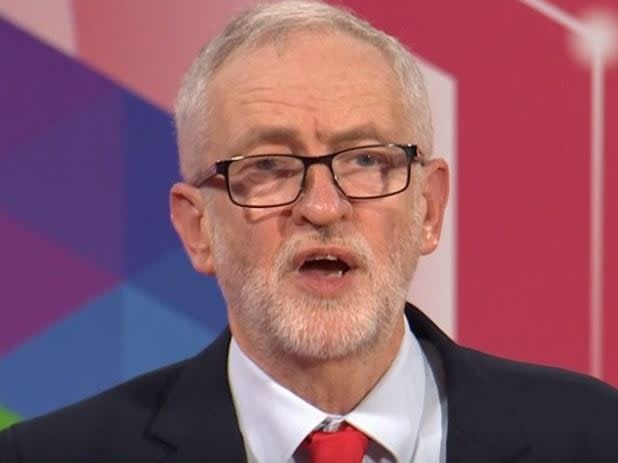Question Time debate: Jeremy Corbyn says he will adopt 'neutral stance' in second Brexit referendum

Jeremy Corbyn says he will adopt a “neutral stance” at the fresh Brexit referendum that would follow a Labour election victory, throwing the party’s policy into fresh confusion.
Labour had announced plans for a special conference, to agree whether to back Remain or Leave, after negotiating a new deal with the EU.
But Mr Corbyn told a question time event: “I will adopt, as prime minister at the time, a neutral stance, so I can credibly carry out the result of that to bring our communities and country together.”
Until now, the Labour leader had not set out what his personal position would be, although he had previously hinted he would stay above the fray.
In contrast, his senior colleagues – John McDonnell, Emily Thornberry, Diane Abbott and Keir Starmer – have all made clear they would hope to campaign for Remain.
In recent days, Mr Corbyn has faced repeated criticism for failing to answer the question of whether he would campaign for his own deal to leave the EU, or to stay in the bloc.
Later, he confirmed his “neutral stance” was the decision he had now reached, telling the audience: “First heard here on Question Time.”
The stance is certain to disappoint many Labour supporters who fought, unsuccessfully, at Labour’s conference in September, for their party to adopt a full-throated Remain stance.
As recently as three weeks ago, Mr Corbyn said Labour would “come to a view as a party” – after that special conference – implying he would abide by the decision.
The stance will also be seized upon by the Liberal Democrats and other Remain parties, who have lost ground to Labour among pro-EU voters on the campaign trail, according to recent polls.
However, Mr Corbyn may be attempting to remove the risk of backing the wrong side in a further referendum and then – like David Cameron – being forced to walk out of Downing Street.
Quizzed in Sheffield, Mr Corbyn confirmed Labour would negotiate a softer Brexit deal within three months, if he wins the 12 December election, and stage a referendum within a further three months.
He was jeered when he first refused to say whether he would back Remain or Leave before, after being pressed a second time, saying: “My role and the role of our government is to ensure that referendum is held in a fair atmosphere and we will abide by the result.”
Adopting a “neutral stance” would allow him to “bring our communities and country together rather than continuing with endless debate about the EU and Brexit”.
During 30 minutes of often-aggressive questioning, Mr Corbyn came under fire over targeting big business, and over antisemitism, misogyny, freedom of speech and his support of ousted Bolivia president Evo Morales.
He insisted firms “should not be frightened”, because only the “biggest businesses will be asked to pay a little bit more” in corporation tax, at a lower level than in 2010.
And, on freedom of speech, he said: “I have spent my life getting into hot water for defending people because I believed their human rights should not be violated and that's the kind of government that I intend to lead.”
Insisting he was “very happy” Labour is being investigated over antisemitism, by the Equality and Human Rights Commission, Mr Corbyn added: “Bad behaviour, misogyny, racism in any form is absolutely not acceptable in any form whatsoever in my party or in society.”
Read more
Could Boris Johnson ever support another Brexit referendum?
We must protect freedom of movement – and only the Lib Dems will
Labour’s radical manifesto will be worthless until Brexit is solved
EU ‘open to’ Labour’s Brexit policy, says Ireland’s Leo Varadkar
Labour drops plans to keep free movement and 2030 climate pledge

 Yahoo News
Yahoo News 
